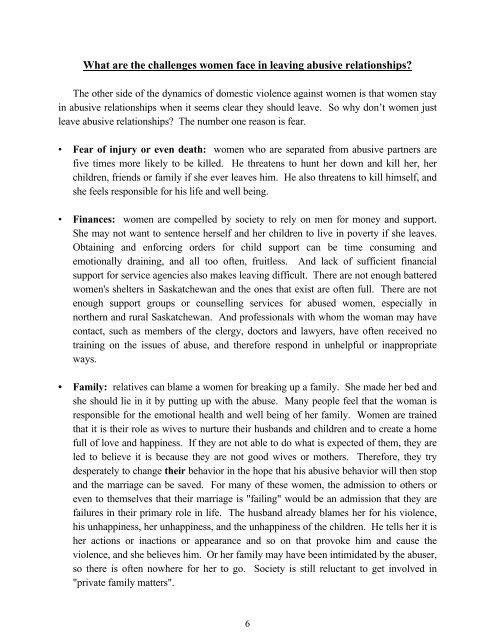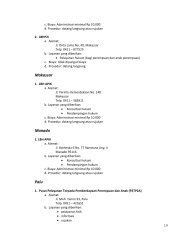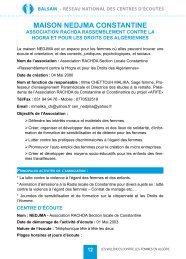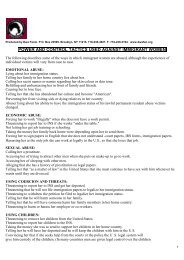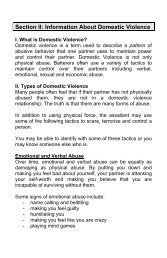Working with Battered Women: a Handbook for ... - Hot Peach Pages
Working with Battered Women: a Handbook for ... - Hot Peach Pages
Working with Battered Women: a Handbook for ... - Hot Peach Pages
Create successful ePaper yourself
Turn your PDF publications into a flip-book with our unique Google optimized e-Paper software.
What are the challenges women face in leaving abusive relationships?The other side of the dynamics of domestic violence against women is that women stayin abusive relationships when it seems clear they should leave. So why don’t women justleave abusive relationships? The number one reason is fear.• Fear of injury or even death: women who are separated from abusive partners arefive times more likely to be killed. He threatens to hunt her down and kill her, herchildren, friends or family if she ever leaves him. He also threatens to kill himself, andshe feels responsible <strong>for</strong> his life and well being.• Finances: women are compelled by society to rely on men <strong>for</strong> money and support.She may not want to sentence herself and her children to live in poverty if she leaves.Obtaining and en<strong>for</strong>cing orders <strong>for</strong> child support can be time consuming andemotionally draining, and all too often, fruitless. And lack of sufficient financialsupport <strong>for</strong> service agencies also makes leaving difficult. There are not enough batteredwomen's shelters in Saskatchewan and the ones that exist are often full. There are notenough support groups or counselling services <strong>for</strong> abused women, especially innorthern and rural Saskatchewan. And professionals <strong>with</strong> whom the woman may havecontact, such as members of the clergy, doctors and lawyers, have often received notraining on the issues of abuse, and there<strong>for</strong>e respond in unhelpful or inappropriateways.• Family: relatives can blame a women <strong>for</strong> breaking up a family. She made her bed andshe should lie in it by putting up <strong>with</strong> the abuse. Many people feel that the woman isresponsible <strong>for</strong> the emotional health and well being of her family. <strong>Women</strong> are trainedthat it is their role as wives to nurture their husbands and children and to create a homefull of love and happiness. If they are not able to do what is expected of them, they areled to believe it is because they are not good wives or mothers. There<strong>for</strong>e, they trydesperately to change their behavior in the hope that his abusive behavior will then stopand the marriage can be saved. For many of these women, the admission to others oreven to themselves that their marriage is "failing" would be an admission that they arefailures in their primary role in life. The husband already blames her <strong>for</strong> his violence,his unhappiness, her unhappiness, and the unhappiness of the children. He tells her it isher actions or inactions or appearance and so on that provoke him and cause theviolence, and she believes him. Or her family may have been intimidated by the abuser,so there is often nowhere <strong>for</strong> her to go. Society is still reluctant to get involved in"private family matters".6


